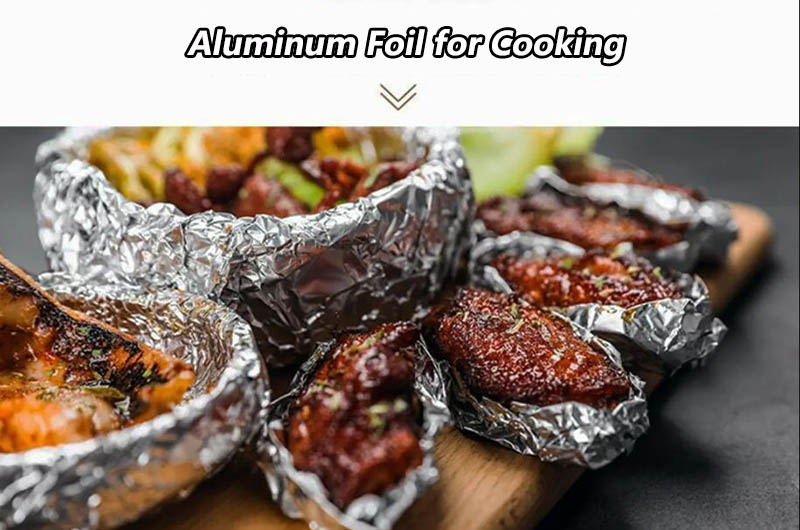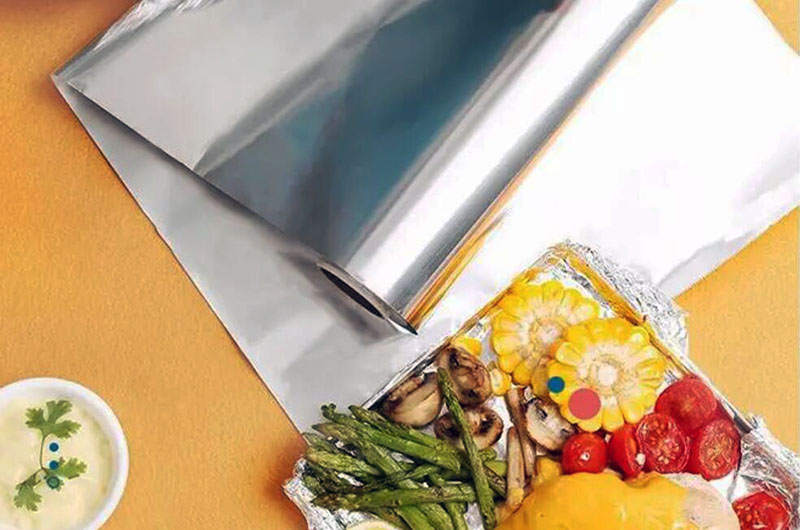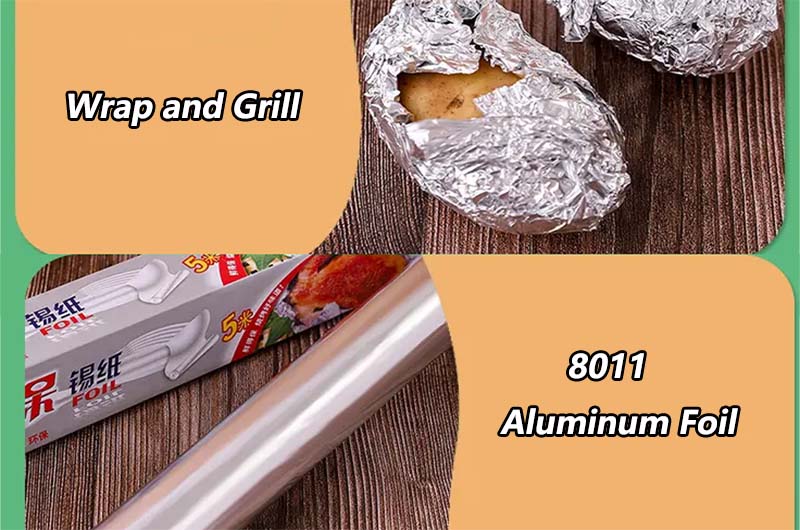- Characteristics of Cooking Aluminum Foil
- Aluminum foil cooking applications
- Common Misconceptions and Concerns About Cooking Aluminum Foil
- Tips for using Cooking Aluminum Foil safely
- People also searched for Aluminum Foil For Cooking Wrapping
- Conclusion
Aluminum foil has become a versatile and essential common material in the kitchen. From packaging to baking, grilling to storage, aluminum foil plays a key role in a variety of cooking applications.
Aluminum foil used for cooking is usually of the 3xxx or 8xxx series of aluminum alloys. The most commonly used household aluminum foil alloy is alloy 8011.
8011 Aluminum Foil for Cooking Wrapping
Composition: 8011 alloy is mainly composed of aluminum, with small amounts of iron, silicon and other elements added.
8011 Cooking Aluminum Foil has excellent formability, high moisture barrier, light barrier, gas barrier and good thermal conductivity. These properties make it ideal for cooking and food packaging applications.

Characteristics of Cooking Aluminum Foil
1. Electrical conductivity and heat resistance
Aluminum foil is an excellent conductor of heat, making it a first choice for a variety of cooking methods. When wrapped around food, it helps distribute heat evenly, ensuring thorough and consistent cooking. Additionally, its heat resistance allows it to withstand high temperatures without affecting its structural integrity.
2. Reflectivity
The reflective surface of aluminum foil plays a vital role in preventing heat loss during cooking. Whether you're baking, grilling, or roasting, aluminum foil reflects heat back onto your food, reducing cooking time and increasing energy efficiency.
3. Scalability and flexibility
One of the key properties of aluminum foil is its ductility. This property allows it to easily wrap foods of different shapes and sizes, creating a tight and secure seal. Its flexibility enables a variety of applications, from packaging delicate fish fillets to forming protective bags for vegetables.
4. Barrier performance
Aluminum foil acts as a barrier against moisture, light and oxygen, protecting food from external factors that could compromise its freshness. This makes it an ideal material for packaging and storing a variety of perishable and non-perishable items.

Aluminum foil cooking applications
1. Wrap and Grill
Aluminum foil is synonymous with packaging barbecue food. Whether you're marinating chicken, vegetables, or seafood, aluminum foil creates an airtight environment that locks in flavor and juices. Direct heat from the grill is evenly distributed, resulting in juicy and perfectly cooked dishes.
2. Bake and bake
In baking and roasting, aluminum foil proves to be a versatile ally. It can be used to cover dishes to prevent over-browning, or to create foil wraps for delicate items like fish or thinly sliced vegetables. The reflective surface enhances browning and crisping, adding texture and flavor to a variety of dishes.
3. Lining and protection
Aluminum foil is often used to line baking sheets and pans to simplify cleanup and prevent food from sticking. It acts as a protective cover, maintaining the integrity of your baking utensils and ensuring easy removal of baked goods.
4. Steaming
For those who prefer healthier cooking methods, aluminum foil aids in steaming and poaching. By creating airtight packages, you can steam vegetables, fish or poultry, retaining nutrients and flavor without adding fat.
5. Freezing and storage
The barrier properties of aluminum foil make it an excellent choice for freezing and storing food. Whether you're preserving leftovers or preparing meals ahead of time, aluminum foil helps prevent freezer burn and preserve the quality of frozen meals.

Common Misconceptions and Concerns About Cooking Aluminum Foil
Although aluminum foil is widely used in the kitchen, there are some common misconceptions and concerns about its safety and environmental impact. Addressing these issues is critical to making informed decisions about its use.
1. Health problems
There are concerns that aluminum may be transferred into food during cooking, raising questions about its impact on health. However, numerous studies have shown that the amount of aluminum leaching into food is so small that it is generally considered safe to eat. It is vital to follow recommended cooking guidelines and avoid using aluminum foil with acidic or salty foods as these increase the risk of aluminum transfer.
2. Environmental impact
The production and handling of aluminum foil does have an impact on the environment. However, aluminum is highly recyclable, and many cities accept aluminum foil recycling programs. By recycling aluminum foil we can contribute to reducing our impact on the environment.
Tips for using Cooking Aluminum Foil safely
To maximize the benefits of aluminum foil while minimizing potential risks, consider the following tips:
1. Avoid high-acid and high-salt foods
Minimize the use of aluminum foil with high-acid and salty foods, as these foods accelerate the transfer of aluminum. For these types of dishes, choose an alternative cooking method, such as parchment paper.
2. Use non-stick cooking spray
To further reduce the risk of food sticking to foil, use nonstick cooking spray or apply a light coating of oil before wrapping or lining in foil.
3. Recycle responsibly
Dispose of aluminum foil responsibly by recycling it. Check your local recycling guidelines and make sure the foil is clean and free of food residue before recycling.
4. Choose high-quality aluminum foil
Choose high-quality aluminum foil to ensure better performance and minimize the risk of tears or punctures during cooking.
People also searched for Aluminum Foil For Cooking Wrapping
- aluminum foil for cooking
- aluminum foil for cooking dangerous
- aluminum foil for cooking food
- alternatives to aluminum foil for cooking
- aluminum foil bad for cooking
- aluminum foil bad for health cooking
- is aluminum foil for cooking safe
- colored aluminum foil for cooking
- gold aluminum foil for cooking
Conclusion
Aluminum foil has definitely become an indispensable tool in the kitchen. Its unique combination of properties, including conductivity, reflectivity and malleability, makes it a versatile companion for a variety of cooking applications.
From grilling and baking to freezing and storage, aluminum foil has proven its ability to increase cooking efficiency and maintain food quality.
